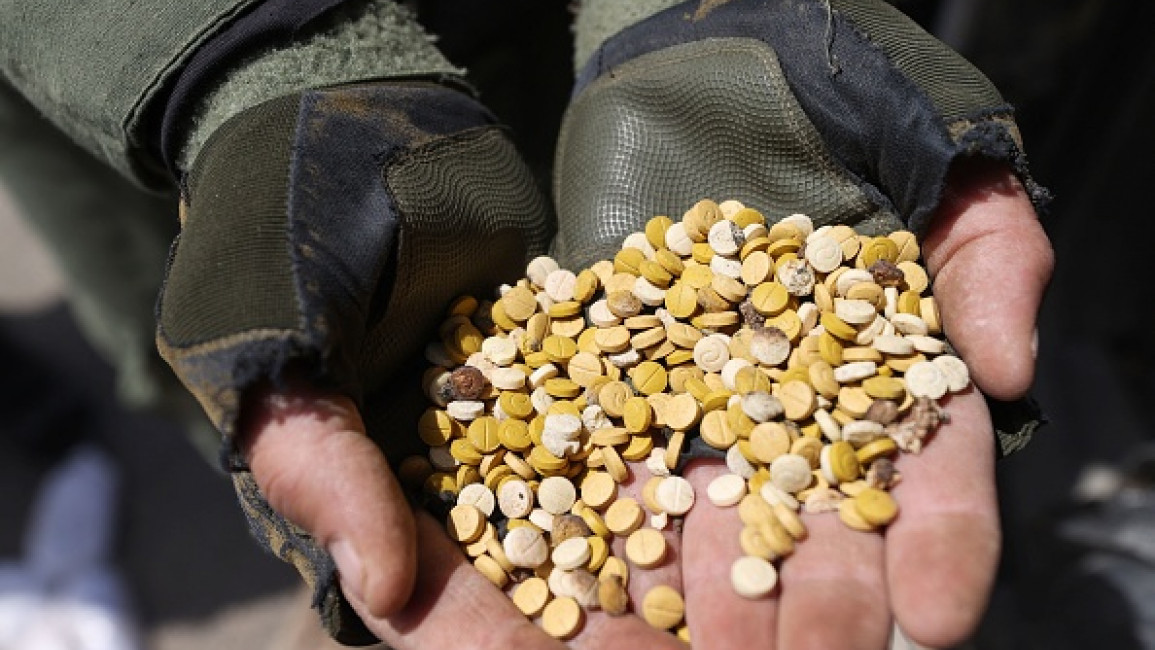
Will Syria's Captagon trade cast a shadow over Assad's normalisation?

Last month, the Arab League ministerial committee responsible for overseeing Syria’s reintegration into the pan-Arab body suspended its meetings with officials from Damascus.
Reportedly, one of the reasons for this decision, which the committee made under US pressure, is the Syrian government’s lack of cooperation with fellow Arab states in regional efforts to clamp down on the Captagon trade.
Although the Captagon issue creates challenges for Arab states that have pushed for Syria’s return to the region’s diplomatic fold, it is doubtful that these Arab governments will reverse their renormalisation with Syria because of Damascus’ inability and/or unwillingness to crack down on the smuggling of this amphetamine.
The majority of Arab League members have decided to renormalise diplomatic relations with Damascus at various points since late 2018 for a host of reasons.
"Although the Captagon issue creates challenges for Arab states that have pushed for Syria's return to the region's diplomatic fold, it is doubtful that these governments will reverse their renormalisation"
At least officially, one reason was the argument that the region’s Captagon crisis could come under more control through diplomatically engaging Damascus.
But that was far from being the main, let alone only, reason for rapprochements with Assad.
Arguably, Captagon was more of a selling point to decrease the amount of criticism that Arab states received from Western capitals following their reconciliations with Assad, rather than a main motivator for bringing Syria in from the cold.
Regardless of how Assad’s reintegration into the Arab world’s diplomatic fold impacts (or doesn’t impact) the Captagon trade, these regional governments have other interests in moving forward with Syria’s reintegration into the region.
Such interests relate to attempts to halt Iranian influence in the Levant, counterterrorism, and refugee issues. Most Arab League members have basically come to terms with the reality of Assad’s rule in Damascus and don’t believe that giving Syria the ‘North Korea treatment’ will serve the region’s long-term interests.
Rather than interpreting this committee’s decision last month as a sign that the renormalisation process with Syria is ending, this move could probably be more accurately understood as a collective push by a handful of Arab states to increase pressure on Assad’s government to do more to clamp down on the Captagon trade.
|
|
Jordan's 'cold and pragmatic' relationship with Syria
Much of the Captagon produced inside Syria goes to Gulf Cooperation Council states via Jordan and Iraq.
Authorities in Amman have been particularly frustrated by the fact that drug trafficking out of Syria has, according to Amman’s chief diplomat, Ayman Safadi, increased since Damascus returned to the Arab League in May.
The view among Jordanian officials is that the Syrian regime has been unwilling to act on requests made by Amman to curtail drug trafficking from Syria into Jordan.
“Amman has always had a delicate relationship with Damascus because Jordan’s priority is to keep instability at bay. The Syrian regime is not delivering on its promises to Jordan regarding curbing the Captagon trade,” said Dr Lina Khatib, Director of the SOAS Middle East Institute, in an interview with The New Arab.
These complaints made by the authorities in Amman must be taken into context. “First, the Syrians seem unwilling to take much additional action without some form of reciprocity, and most Arab countries have yet to contribute substantially to Syria’s recovery,” Sam Heller, a fellow at Century International, told TNA.
"The Syrian regime is not delivering on its promises to Jordan regarding curbing the Captagon trade"
“Second, Syrian-Jordanian relations have been fraught and unpleasant for decades, so this type of disgruntlement on the Jordanians’ part is not an entirely new thing. The Jordanians have a lot of experience being unhappy with their intransigent Syrian neighbours,” added Heller.
Jordan’s government has not only made complaints. On at least nine occasions this year the Jordanian armed forces have shot down drug-laden drones that crossed into Jordan from Syria.
“Regional officials deny that Jordan coordinated these strikes with the Syrian government, but Syrian officials have conspicuously avoided blaming Jordan for these actions, raising questions about some form of collusion, or at a minimum Syria’s acquiescence after the fact,” said Heller.
The ways in which Jordan has dealt with Assad and Syria’s role as a producer and trafficker of Captagon should be seen within the context of Amman’s cold and pragmatic relationship with Damascus.
“Whereas Jordanian authorities have favoured the normalisation of relations with the Assad regime to better control the Syria-Jordan border, they never trusted the Syrian regime to take down the Captagon trade,” Dr Marina Calculli, a Columbia University research fellow in the Department of Middle Eastern, South Asian and African Studies, told TNA.
“[Officials in Amman] are aware that they cannot establish meaningful cooperation with Damascus to eradicate Captagon smugglers and that they must police the border themselves. But, since Syria needs Jordan’s political endorsement in this delicate phase, Jordan is also counting on the fact that the Assad regime can’t protest, let alone retaliate against, their anti-Captagon operations,” added Dr Calculli.
|
|
Leveraging Captagon for political purposes
Throughout history, Syria’s Baathist regime has masterfully leveraged problems in the region (including those of its own making) to extract concessions from foreign governments in pursuit of Damascus’s own interests.
The Captagon trade is an example of this in the current period. Yet, some analysts raise doubts about the Syrian regime’s capacity to effectively use the Captagon card for such purposes.
“The Captagon trade is only useful leverage for Damascus if affected Arab countries believe Damascus is actually capable of curtailing Captagon production and trafficking,” Heller told TNA.
“If they become convinced that Damascus is not limiting Captagon flows because it is unable to limit them, then the Captagon trade is no longer leverage with which Damascus can bargain and trade.”
"The Captagon trade is only useful leverage for Damascus if affected Arab countries believe Damascus is actually capable of curtailing Captagon production and trafficking"
At this point, officials in Damascus see Syria’s rapprochements with US-friendly Arab states such as Saudi Arabia and the UAE as potential opportunities to convince these regional players to use their lobbying influence in Washington in ways that could benefit Assad’s government.
The thinking is that the UAE in particular might be able to persuade US policymakers to approach Syria differently by lifting, or at least easing, the crippling Caesar Act under some arrangement.
When Syria’s Foreign Minister Faisal Mekdad was meeting with some of his Arab counterparts in Jordan on 1 May, he said that “progress on curbing Captagon depended on Arab pressure on the United States to ease sanctions,” reported Reuters.
“The Saudis and the Emiratis do indeed have enough leverage in Washington to press the United States to soften some of its policies against the Syrian government,” Dr Mehran Kamrava, a professor of government at Georgetown University in Qatar, told TNA.
“The real question is, what would they expect in return from the Assad government? The answer, I believe, is less cozy relations with Tehran and more of a pro-Saudi and UAE stance.”
However, some experts reject the argument that Captagon could possibly serve to enhance the Assad government’s leverage over regional governments.
“The Captagon trade is not giving Syria leverage over other Arab states because the Captagon market in the richest Arab states has reached its maximum without causing these states significant security concerns that would require asking Assad for favours,” according to Dr Khatib.
“What the Captagon trade is giving Assad’s government is a contribution to a sense of regional legitimacy for this government.”
Economic crises
Syria’s extreme economic problems and humanitarian disasters have contributed to the rise of Captagon production in the war-shattered country.
From a currency plunge to widespread fuel shortages and spiralling inflation to skyrocketing food prices, there are countless economic crises in Syria, where earlier this year the UN assessed that 90 percent of the population lives below the poverty line.
The West is not entirely blameless here. Although fully attributing Captagon production in Syria to US and European sanctions is not necessarily reasonable, the West’s financial warfare against Syria has undeniably contributed to the situation.
"I'm not sure if I would draw a direct causal link between Captagon production in Syria and Western sanctions, but certainly Jordanian officials say that Captagon trafficking increased substantially in 2019 and 2020, once Syria’s economic crisis really got underway. US and other Western sanctions are just one factor among several that have contributed to that crisis, but they have contributed nonetheless,” said Heller.
"The Syrian economy is a war economy mainly because the Syrian regime has consistently opted to ravage the country rather than find a political compromise"
“Whereas Western sanctions have contributed to [the development of] black markets in Syria, it would be misleading to establish direct causation between them and the development of Captagon,” Dr Calculli told TNA.
“The Syrian economy is a war economy mainly because the Syrian regime has consistently opted to ravage the country rather than find a political compromise,” she added.
“It is the war that has generated a demand for a parallel black economy, through which the Syrian regime is continuing to finance its war efforts against its own population.”
Giorgio Cafiero is the CEO of Gulf State Analytics.
Follow him on Twitter: @GiorgioCafiero




